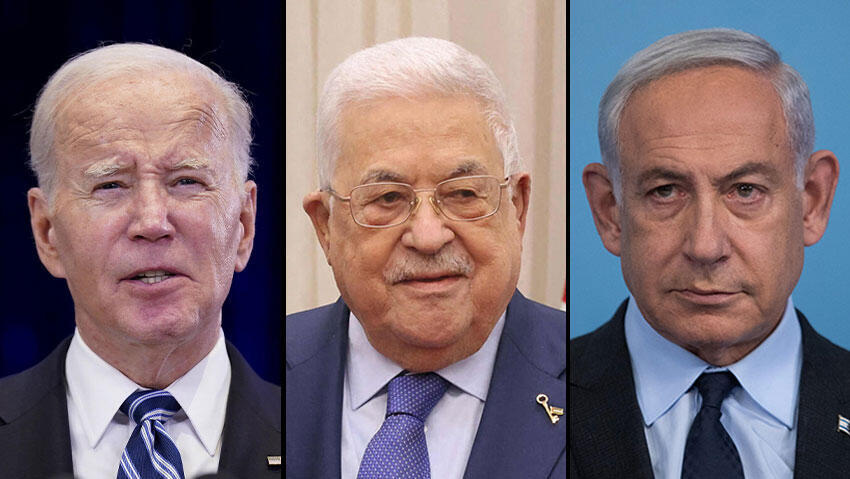Getting your Trinity Audio player ready...
The Biden administration and a small group of Middle East partners are “rushing to complete a detailed, comprehensive plan for long-term peace between Israel and Palestinians, including a firm timeline for the establishment of a Palestinian state, that could be announced as early as the next several weeks,” the Washington Post reported Thursday morning.
Read more:
According to the report, the urgency of completing such a plan is directly tied to efforts to halt the fighting in Gaza and secure the release of Israeli hostages held by Hamas and allied terrorist factions.
2 View gallery


US President Joe Biden, Palestinian Authority Chairman Mahmoud Abbas and Prime Minister Benjamin Netanyahu
(Photo: GHANAIM / PPO / AFP, AP Photo/Evan Vucci, Alex Kolomoisky)
U.S. and Arab officials said that an initial six-week cease-fire would provide time to publicize the plan, garner support and take preliminary steps toward its implementation, including the formation of an interim Palestinian government.
Planners are hopeful that a hostage deal can be secured before the start of the month of Ramadan, a time of heightened religious fervor that could exacerbate already high tensions with Palestinians in the West Bank and within Israel in less than a month. "The key is the hostage deal," a U.S. official told the newspaper.
As the United States and its partners in the plan, including Egypt, Jordan, Qatar, Saudi Arabia, the United Arab Emirates and Palestinian representatives, work toward reaching agreements among themselves, there is concern that a wide-scale Israeli military operation in the southern Gaza Strip’s highly crowded Rafah, which hosts over a million Palestinians displaced by fighting, could derail this effort and the prospect of securing a hostage deal.
“The elephant in the planning room is Israel, and whether its government will acquiesce to much of what is being discussed: The withdrawal of many, if not all, settler communities on the West Bank; a Palestinian capital in East Jerusalem; the reconstruction of Gaza; and security and governance arrangements for a combined West Bank and Gaza,” the report noted.
“The hope is that Israel would also be offered specific security guarantees and normalization with Saudi Arabia and other Arab states that would be hard to refuse.”
Prime Minister Benjamin Netanyahu has given no indication that he is ready to budge on either Hamas' demands for a hostage deal, or his opposition to a Palestinian state.
Prime Minister Benjamin Netanyahu talks to ABC News about expanding Israeli military operations to Gaza's Rafah
(Video: ABC News)
“Everybody who talks about a two-state solution — well, I ask, what do you mean by that?” Netanyahu said Sunday on ABC News’s “This Week.” “Should the Palestinians have an army? ... Should they continue to educate their children for terrorism and annihilation? Of course, I say, of course not.”
“The most important power that has to remain in Israel’s hands,” he said, “is overriding security control in the area west of the Jordan” river.
U.S. officials said the menu of actions under consideration include early U.S. recognition of a Palestinian state — even as elements of political reform, security guarantees for both Israel and the Palestinians, normalization and reconstruction are being implemented.
“We don’t want to lose the momentum of this moment by doing this in pieces and in parts,” said a U.S. official briefed on the talks. There is a desire, the official said, to know “what this looks like from day one.”
One Arab official said Hamas’s political wing should be included in the talks, if not in the future government. “We need someone there who represents them to ensure they’re on board with this,” the official said.
“If not, and they’re not happy about it, we will have Fatah and Hamas all over again,” the official said, referring to earlier confrontations between the two Palestinian groups that ultimately led to Hamas’s election as the governing power in Gaza. But if they can achieve two years of stability and prosperity under a revitalized government, the official said, “no one will choose Hamas” at the ballot box.
Finance Minister Bezalel Smotrich, a far-right lawmaker with deep ties to the Jewish settlement movement in the West Bank, blasted the report and flatly rejected efforts to establish a Palestinian state, saying it would be tantamount to rewarding Hamas for its October 7 terrorist attack on southern Israel.
"Under no circumstances will we agree to this plan, which essentially rewards the Palestinians for the horrendous massacre they committed against us: a Palestinian state with Jerusalem as its capital,” he wrote on X.
“The message is that it pays off to slaughter Israeli citizens wholesale. A Palestinian state is an existential threat to Israel; Kfar Saba will not become Gaza.
“Today, at the cabinet meeting, I will demand a clear and unequivocal decision stating that Israel opposes the establishment of a Palestinian state and the imposition of sanctions on over half a million settlers. I expect unequivocal support from Netanyahu, Gantz, Eisenkot and all ministers."
National Security Minister Itamar Ben-Gvir, another far-right lawmaker and ally of Smotrich, also condemned the budding plan. “1,400 murdered and the world wants to give them a state. Won’t happen,” he posted to X.
Speaking to Ynet in an interview, Education Minister Yoav Kisch of Prime Minister Netanyahu’s ruling Likud Party, effectively dismissed such an initiative. "We are solely focused on victory in Gaza. There will simply be no reward for murderers," he said.






